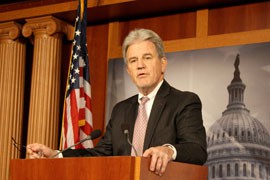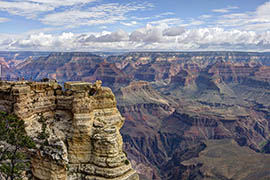Cronkite News has moved to a new home at cronkitenews.azpbs.org. Use this site to search archives from 2011 to May 2015. You can search the new site for current stories.
Report blames national parks maintenance backlog on Congress
WASHINGTON – Congress is letting maintenance backlogs grow in national parks like the Grand Canyon while continuing to add new sites that the National Park Service cannot afford to maintain, a report Tuesday charged.
The report from Sen. Tom Coburn, R-Okla., called the service’s $11.5 billion maintenance backlog an “unfortunate symbol of the dysfunction in Washington, D.C.”
It said Congress underfunded the park service’s maintenance budget by $256 million this year, even as it allocated $57 million to acquire more land and spends $255 million to $529 million a year to acquire land through the Land and Water Conservation Fund.
Coburn said Congress should stop acquiring land and reallocate that money to parks like the Grand Canyon, which had a $405 million maintenance backlog in 2012. That backlog has left the park unable to repair trails or fix a deteriorating 50-year-old water pipeline that has forced park officials to sometimes fly in bottled water and left no additional water for fire protection.
“They’re not even replacing water lines that are 50 years old, and sometimes they can’t even flush the toilets because we’re not doing the critical maintenance,” Coburn said Tuesday. “And people love that site – I mean it’s an amazing site. And we should prioritize our national parks and take care of the gems.”
The report also cited Lake Mead Recreation Area, straddling the Arizona- Nevada border. It now has a maintenance backlog of more than $290 million.
Rep. Ann Kirkpatrick, D-Flagstaff, said in an emailed statement Tuesday that parks like the Grand Canyon have a major impact on northern Arizona economies.
“When national parks like the Grand Canyon thrive, our local economies thrive,” her statement said. “So when there’s a maintenance backlog that could threaten park operations, taking action must be a priority.”
While large sites are being neglected, Coburn’s report said Congress is creating too many small parks with too few visitors: More than 70 national parks attract fewer than 100 visitors per day.
In Arizona, the report pointed to the Hohokam Pima National Monument on the Gila River Indian Reservation, which does not allow visitors, and Fort Bowie National Historic Site in southeast Arizona as two little-used sites.
Coburn said Congress and the president should stop creating new national parks entirely. In April, President Barack Obama created five new national monuments using the Antiquities Act.
“First of all, I don’t think there should be another national park,” Coburn said. “We’ve got 401. Name an area in the country that really qualifies for being a national park, that we haven’t already made a national park.”
While the report’s criticisms were aimed at Congress, some national parks advocates felt Coburn was shifting some of the blame for maintenance problems onto National Park Service employees.
Joan Anzelmo, spokeswoman for the Coalition of National Park Service Retirees, questioned why the report referred to the park service as a symbol of dysfunction and why it referenced national park closures during the federal government shutdown.
“It’s hard to see an honest motive in this report and in some of the language,” Anzelmo said.
And cutting the land acquisition budget would do little to dent the maintenance deficit, said Craig Obey, spokesman for the National Parks Conservation Association. Even if the park service’s entire land acquisition budget were used for maintenance, the park service would still have added nearly $200 million to its backlog.
Obey said there are still good reasons to create new national parks. For example, the Flight 93 National Memorial, which honors the passengers and crew on the Sept. 11, 2001, flight that crashed in southwestern Pennsylvania, would not exist if the park service had simply decided to stop adding new parks, Obey said.
“When this country stops making history, maybe we stop making parks,” he said.








